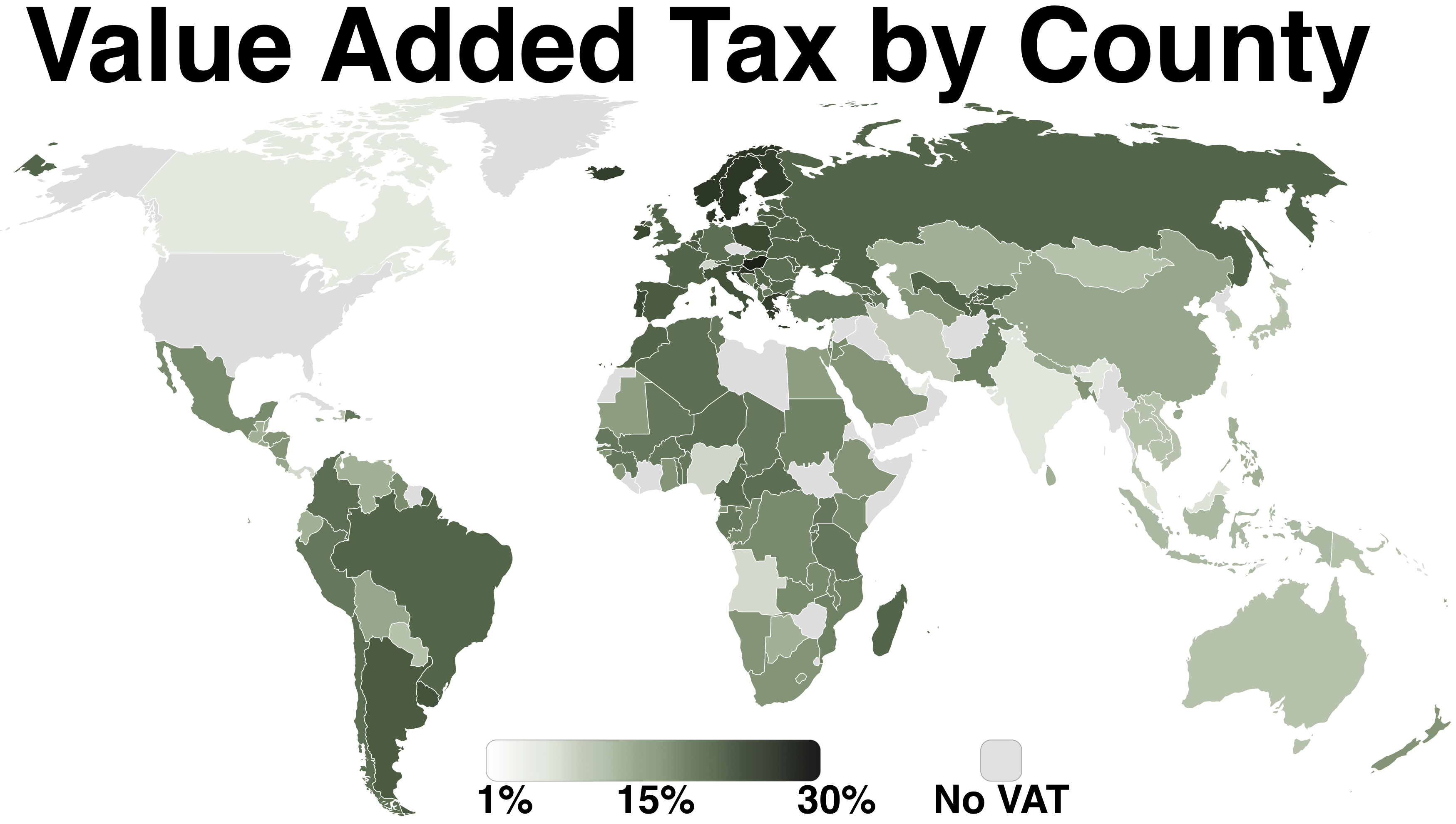|
Destination Principle
The destination principle is a concept of international taxation which allows for value added taxes to be retained by the country where the taxed product is being sold. They are collected on imports and rebated on exports. This principle is also applied to the Goods and Services Tax of several countries like India. Origin versus destination principle According to Alan V. Deardorff at the University of Michigan, Ann Arbor, the origin principle, in contrast to the destination principle in international taxation is the principle "that value added taxes be kept only by the country where production takes place". Under the origin principle, value added taxes are not collected on imports and not rebated on exports. In contrast, the destination principle, which allows for value added taxes A value-added tax (VAT), known in some countries as a goods and services tax (GST), is a type of tax that is assessed incrementally. It is levied on the price of a product or service at each stag ... [...More Info...] [...Related Items...] OR: [Wikipedia] [Google] [Baidu] |
International Taxation
International taxation is the study or determination of tax on a person or business subject to the tax laws of different countries, or the international aspects of an individual country's tax laws as the case may be. Governments usually limit the scope of their income taxation in some manner territorially or provide for offsets to taxation relating to extraterritorial income. The manner of limitation generally takes the form of a territorial, residence-based, or exclusionary system. Some governments have attempted to mitigate the differing limitations of each of these three broad systems by enacting a hybrid system with characteristics of two or more. Many governments tax individuals and/or enterprises on income. Such systems of taxation vary widely, and there are no broad general rules. These variations create the potential for double taxation (where the same income is taxed by different countries) and no taxation (where income is not taxed by any country). Income tax syste ... [...More Info...] [...Related Items...] OR: [Wikipedia] [Google] [Baidu] |
Value Added Taxes
A value-added tax (VAT), known in some countries as a goods and services tax (GST), is a type of tax that is assessed incrementally. It is levied on the price of a product or service at each stage of production, distribution, or sale to the end consumer. If the ultimate consumer is a business that collects and pays to the government VAT on its products or services, it can reclaim the tax paid. It is similar to, and is often compared with, a sales tax. VAT is an indirect tax because the person who ultimately bears the burden of the tax is not necessarily the same person as the one who pays the tax to the tax authorities. Not all localities require VAT to be charged, and exports are often exempt. VAT is usually implemented as a destination-based tax, where the tax rate is based on the location of the consumer and applied to the sales price. The terms VAT, GST, and the more general consumption tax are sometimes used interchangeably. VAT raises about a fifth of total tax revenues b ... [...More Info...] [...Related Items...] OR: [Wikipedia] [Google] [Baidu] |
Imports
An import is the receiving country in an export from the sending country. Importation and exportation are the defining financial transactions of international trade. In international trade, the importation and exportation of goods are limited by import quotas and mandates from the customs authority. The importing and exporting jurisdictions may impose a tariff (tax) on the goods. In addition, the importation and exportation of goods are subject to trade agreements between the importing and exporting jurisdictions. History Definition Imports consist of transactions in goods and services to a resident of a jurisdiction (such as a nation) from non-residents. The exact definition of imports in national accounts includes and excludes specific "borderline" cases. Importation is the action of buying or acquiring products or services from another country or another market other than own. Imports are important for the economy because they allow a country to supply nonexistent, scar ... [...More Info...] [...Related Items...] OR: [Wikipedia] [Google] [Baidu] |
Exports
An export in international trade is a good produced in one country that is sold into another country or a service provided in one country for a national or resident of another country. The seller of such goods or the service provider is an ''exporter''; the foreign buyer is an ''importer''. Services that figure in international trade include financial, accounting and other professional services, tourism, education as well as intellectual property rights. Exportation of goods often requires the involvement of customs authorities. Firms Many manufacturing firms begin their global expansion as exporters and only later switch to another mode for serving a foreign market. Barriers There are four main types of export barriers: motivational, informational, operational/resource-based, and knowledge. Trade barriers are laws, regulations, policy, or practices that protect domestically made products from foreign competition. While restrictive business practices sometimes ... [...More Info...] [...Related Items...] OR: [Wikipedia] [Google] [Baidu] |
Value Added Tax
A value-added tax (VAT), known in some countries as a goods and services tax (GST), is a type of tax that is assessed incrementally. It is levied on the price of a product or service at each stage of production, distribution, or sale to the end consumer. If the ultimate consumer is a business that collects and pays to the government VAT on its products or services, it can reclaim the tax paid. It is similar to, and is often compared with, a sales tax. VAT is an indirect tax because the person who ultimately bears the burden of the tax is not necessarily the same person as the one who pays the tax to the tax authorities. Not all localities require VAT to be charged, and exports are often exempt. VAT is usually implemented as a destination-based tax, where the tax rate is based on the location of the consumer and applied to the sales price. The terms VAT, GST, and the more general consumption tax are sometimes used interchangeably. VAT raises about a fifth of total tax revenues ... [...More Info...] [...Related Items...] OR: [Wikipedia] [Google] [Baidu] |
Goods And Services Tax (India)
Goods and Services Tax (GST) is an indirect tax (or consumption tax) used in India on the supply of goods and services. It is a comprehensive, multistage, destination-based tax: comprehensive because it has subsumed almost all the indirect taxes except a few state taxes. Multi-staged as it is, the GST is imposed at every step in the production process, but is meant to be refunded to all parties in the various stages of production other than the final consumer and as a destination-based tax, it is collected from point of consumption and not point of origin like previous taxes. Goods and services are divided into five different tax slabs for collection of tax: 0%, 5%, 12%, 18% and 28%. However, petroleum products, alcoholic drinks, and electricity are not taxed under GST and instead are taxed separately by the individual state governments, as per the previous tax system. There is a special rate of 0.25% on rough precious and semi-precious stones and 3% on gold. In addition ... [...More Info...] [...Related Items...] OR: [Wikipedia] [Google] [Baidu] |
Alan Deardorff
Alan V. Deardorff (born 1944) is the John W. Sweetland Professor of International Economics and a Professor of Economics and Public Policy at the University of Michigan Gerald R. Ford School of Public Policy, Ann Arbor.Alan V. Deardorff , Department of Economics, Faculty Deardorff received his Ph.D. in Economics from in 1971. Deardorff is the author o [...More Info...] [...Related Items...] OR: [Wikipedia] [Google] [Baidu] |
University Of Michigan
, mottoeng = "Arts, Knowledge, Truth" , former_names = Catholepistemiad, or University of Michigania (1817–1821) , budget = $10.3 billion (2021) , endowment = $17 billion (2021)As of October 25, 2021. , president = Santa Ono , provost = Laurie McCauley , established = , type = Public research university , academic_affiliations = , students = 48,090 (2021) , undergrad = 31,329 (2021) , postgrad = 16,578 (2021) , administrative_staff = 18,986 (2014) , faculty = 6,771 (2014) , city = Ann Arbor , state = Michigan , country = United States , coor = , campus = Midsize City, Total: , including arboretum , colors = Maize & Blue , nickname = Wolverines , sp ... [...More Info...] [...Related Items...] OR: [Wikipedia] [Google] [Baidu] |
Ann Arbor, Michigan
Ann Arbor is a city in the U.S. state of Michigan and the county seat of Washtenaw County. The 2020 census recorded its population to be 123,851. It is the principal city of the Ann Arbor Metropolitan Statistical Area, which encompasses all of Washtenaw County. Ann Arbor is also included in the Greater Detroit Combined Statistical Area and the Great Lakes megalopolis, the most populated and largest megalopolis in North America. Ann Arbor is home to the University of Michigan. The university significantly shapes Ann Arbor's economy as it employs about 30,000 workers, including about 12,000 in the medical center. The city's economy is also centered on high technology, with several companies drawn to the area by the university's research and development infrastructure. Ann Arbor was founded in 1824, named after the wives of the village's founders, both named Ann, and the stands of bur oak trees.Marwil, pp. 1–2 The city's population grew at a rapid rate in the early ... [...More Info...] [...Related Items...] OR: [Wikipedia] [Google] [Baidu] |





